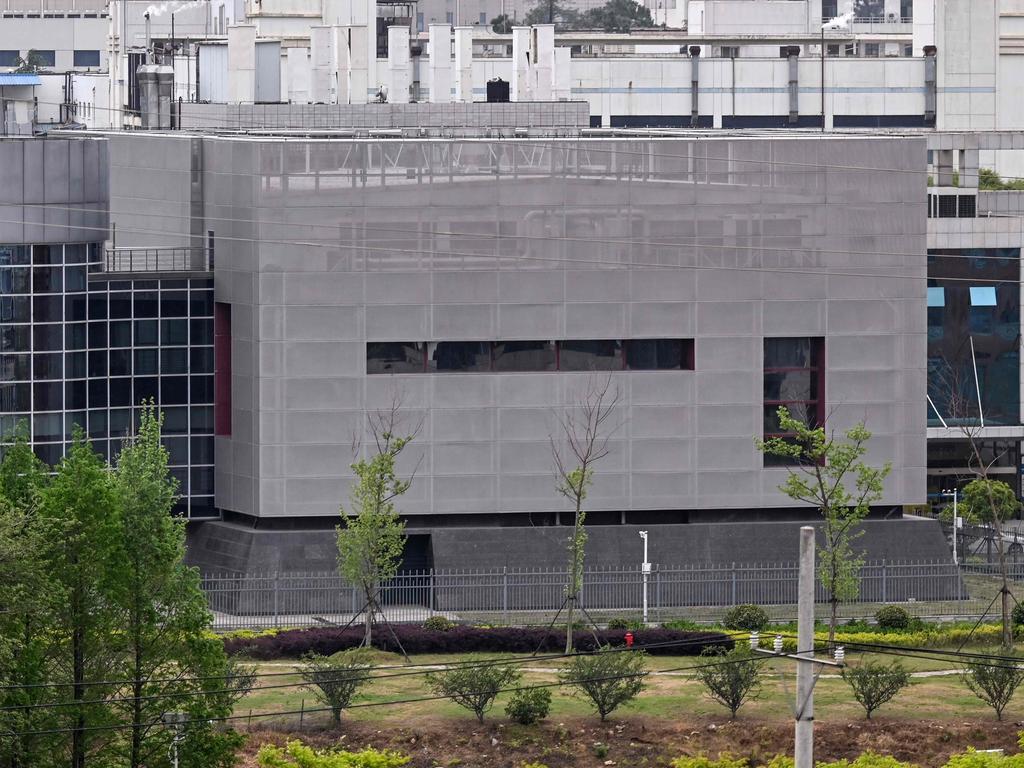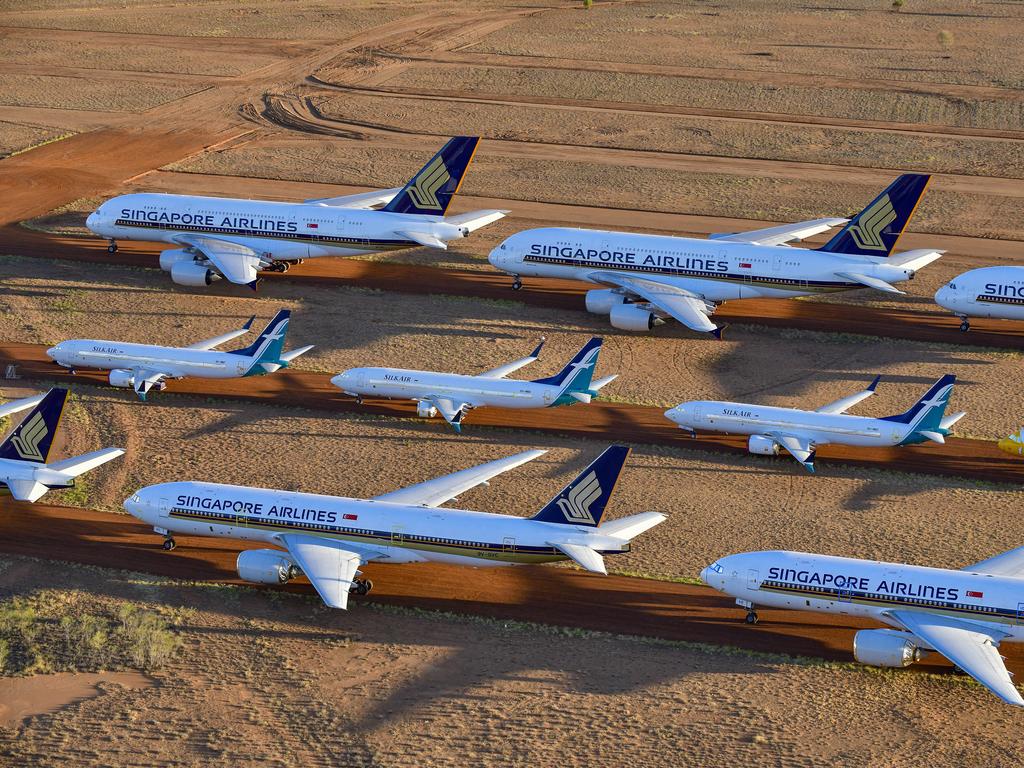Coronavirus: Bill Moss predicts nation will emerge from pandemic a ‘global star’
At Macquarie Bank Bill Moss earned a reputation for predicting the future. From home isolation, he surveys the post-pandemic nation.
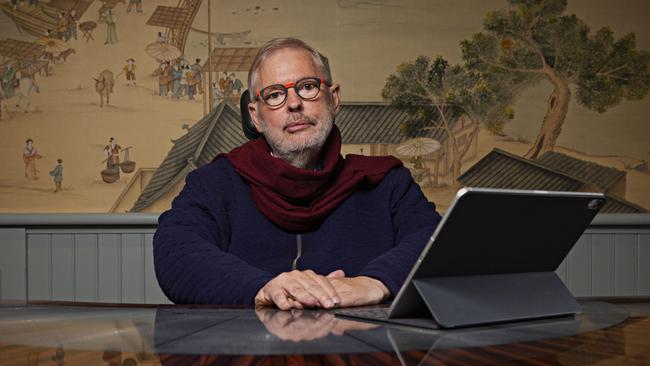
It is early afternoon at Mount Wilson, and Bill Moss is zooming — we’re using that word in the old-fashioned way — down the driveway in his electronic wheelchair.
He’s racing his three-year-old granddaughter, Billie, who somehow manages to win, not just this heat, but all the heats.
“Of course, she does,” says Moss, 66. “She wins by a metre and a half every time. It’s uncanny.”
Wheelchair racing is one of the ways the former Macquarie banker is keeping himself entertained during coronavirus. Because of his condition — Moss has lived with facioscapulohumeral dystrophy, or FSHD, a form of the muscle-wasting disease, muscular dystrophy, since he was 28 years old — he must stay isolated, and so he’s holed up at Dennarque, his beautiful cold-climate garden estate in the Blue Mountains.
His wife, Lata, is with him, as is his daughter, Natalie, her husband, Corey, and their two children, Billie, the running champion; and Jaimie, who at 18 months just dashes all over the place. They’re working to keep grandpa well — Moss requires around-the-clock carers, to lift him from bed and so forth — and he’s considering how the post-COVID-19 world might heal.
Moss has something of a reputation for being able to predict the future. He was employee No 32 at Macquarie Bank, where he made tens of millions of dollars betting on such things as the rise of China (it was rickshaws and bicycles the first time he went; he came back saying it’s the future, and Macquarie backed him on it).
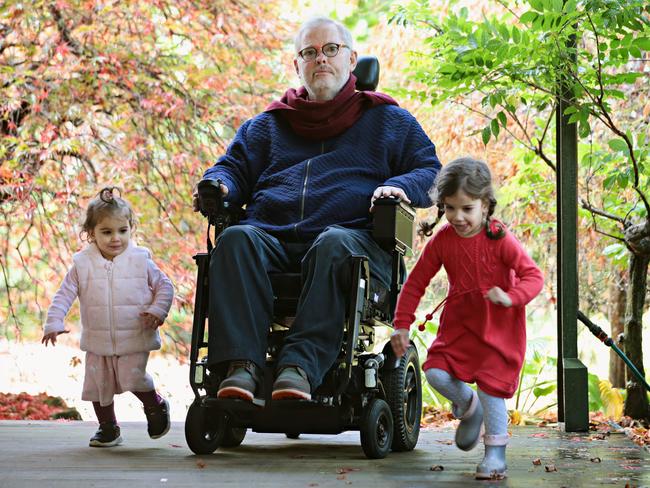
Moss has also had to cope, all his life, with deprivation, and a degree of frustration. He was the guy with the limp when he started at Macquarie. Then he was the guy with the cane, and then the guy who had to employ another guy — a big Samoan — to carry him on to the plane and help him off again. He gets how frustrated everyone is — no pools, no gyms, no cinema, no shopping — and he’s well placed to offer some guidance.
“The reality of my condition is, I lose some function every day,” he says.
“One day, I wake up, I realise I can no longer turn over in bed. So now you’ve got to learn to sleep without turning over. Short-term, it’s a problem. Longer-term, you find a way of doing it. Because the reality is, you still go to bed, and you still wake up.
“What choice do you have? You have got to be able to adapt, and the quicker you can, the better you’ll be. That’s true in any crisis.”
And it’s particularly true for business.
“So, let’s say there’s something your business can’t do any more. You have to adapt, or it will be the end of you,” says Moss.
One example: until two months ago, you couldn’t sell a house in Sydney without a traditional campaign, with multiple opens-for-inspection (stunt towels in the bathrooms, bread baking in the oven, quiet music playing in the background, that kind of thing).
Houses are now being sold online, sometimes to buyers who have never set foot in the place. And, as ever with capitalism, it’s been the quick or the dead: those real estate agents who have managed a swift pivot to video technology are coping best.
“We will see more of that, because in every crisis, technology booms,” says Moss. “It happened after the First World War, and again after the Second World War. We find ways of doing things smarter.
“And technology — and those who develop and invest in it — will be the winner from this crisis, no doubt at all.”
Moss says COVID-19 is the kind of event that has the capacity to change a generation forever.
“I’m a great believer, every 30 or 40 years, there comes an event that shapes society. It might be war, it might be a depression, it might be something like this, which, if you think about it, was always going to happen,” he says.
“There has always been the risk of a global pandemic. We have them all the time. Why would we think we wouldn’t have one here? And it will change the generation that lives through it.”
Moss cites his mum as an example: she is 96 and still living on her own. She grew up during the Depression, “and her whole life, even today, how she manages money, what she thinks she needs, is determined by the Depression”.
“That generation is still affected by what they went through. It’s the same for people who went through the wars, whatever the catastrophe was. This will change young people. It will change the way they think, if they can’t get a job, they can’t go overseas, if they can’t have the same physical contact we’ve taken for granted, that changes them.
“We don’t know what that means, but we do know that it means something.”

He doesn’t think the economic effect will be short-term, either.
“Oh, there is going to be a recession,” he says. “No question. You can’t just turn a switch, and everything goes back to normal. Are people spending more? No. They are saving whatever money they have.
“Talk to older people about what they are doing with their stimulus payments. They’re putting them in the bank. So, recession is inevitable. Economically, this is not going to be a V-recovery. It’s not. This is a major change. The way we interact with people, what we buy, how we spend our work time, all of that is changing and will continue to change.”
Some people will start to think about “going to the office” as real Mad Men stuff. What is the point of all those rows of desks, with phones that never ring, when it’s so easy to work remotely?
The flexibility that women have been seeking for years is also now upon us.
“We will go back to the office, to some extent,” says Moss. “But many people will be saying, ‘I’m happy not to work Fridays. Or else, Monday, Wednesday, Thursday, I’m working from home. I can save on travelling time, and I will see my family more often’.
“The key to all that is having the right technology and the right management systems, to make sure people are productive. And that’s hard when you’re doing things that can’t easily be measured on a daily basis, like: how many clients did you call today?
“But you can have some things that employees are required to do every day, in order to build routines.”
Another example: going to the doctor.
“We talked about the office as real 1950s stuff, but the GP, that’s real 1900s stuff. But now the telehealth revolution is finally here, and it’s so easy. You have a five-minute conversation with your doctor, and he debits your credit card. They’re happy. You’re happy. That kind of flexibility won’t be given up easily.
“It’s going to impact the way we spend our leisure time, too. Overseas travel will be difficult for years. You might still go on a cruise, but most won’t, and if you fly, you’ll have to quarantine two weeks there, and two weeks here, and that’s not practical for most people.
“So, quite logically, there will be a boom in domestic tourism, especially outside the major cities.”
Moss says Australia is likely to come out of the crisis “as the global star. And that’s going to mean more people wanting to live here. And that is going to lead to social change, and probably tension”.
Many Australians will want to protect what we defended during COVID-19, perhaps by closing borders, and creating some kind of island economy. That may bring on a push for lower levels of immigration, and probably also the growth of political parties with an anti-globalisation agenda.
“It’s a huge political debate right now: we don’t need China, until we realise that means you will earn less money; you’ve got fewer choices, and we’ve got to pay more for things,” says Moss.
“China needs Australia, and we need China. If we cut links, we will be in a huge recession and we are not ready for that. There are times when economics and politics and social welfare need to come together.
“That’s called diplomacy.”
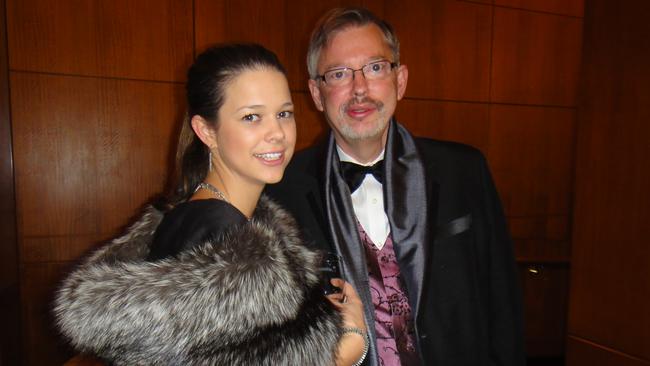
Moss himself has had to pivot when it became apparent there would be no Sydney Chocolate Ball this year. It’s been the main source of income for the FSHD Global Research Foundation, which funds research into his condition: “And suddenly that’s gone, and you’ve got overheads, so what do you do? You can sit and moan, and wait for government money, or you go and try to do what we’re doing: the Chocolate Ball, online.”
He’s seen changes on the home front, too.
“I need a lot of assistance with showering and that kind of thing and it’s difficult even in good times to get carers,” he says. “Or, as I sometimes say, it’s easy to get carers, but hard to get people who really care. And it’s tougher now than ever. Some carers can’t work at the moment. They are at home, looking after kids. Some of them have a number of part-time positions, and that may include working in nursing homes, and you have to make a decision, do you want them to come to you? Because I am high-risk. I have to stay as well as I can, and not just physically. We all need to stay well. We have to get our sleep, and control our anxiety, and keep on top of mental health.”
To that end, he’s got the wheelchair races, but he’s also been reading “invisible books” from the “invisible bookshelf” he established at Mount Wilson when the grandkids arrived. How does that work? The little ones choose the topic and Moss makes up the story. And how does it end? Well, that’s something we’re all going to figure out, as we keep forging on.
Sydneychocolateball.com; FSHD Global Research Foundation allocates 100 per cent of tax-deductible donations to fund a cure for FSHD muscular dystrophy.


